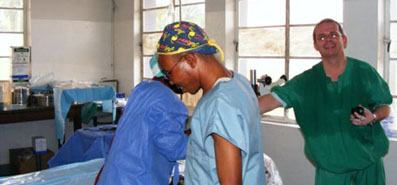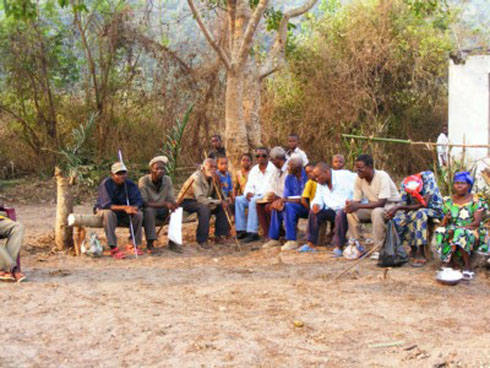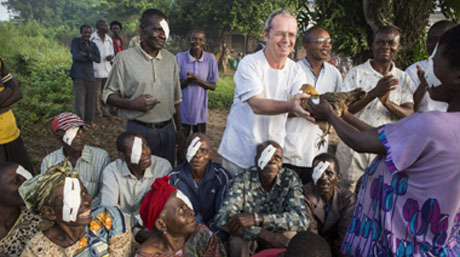At last we managed to get to Lusambo. For years we have had telephone calls from patients and other, unfamiliar, persons telling us: "Doctor, there are countless sick people around here; when are you coming at last? There has been no ophthalmologist here in Sankuru Province since the war!" The majority of calls came from a gentleman called Jules, he rang practically every week, always saying the same thing: "Doctor, when are you coming at last, there are very many people here with eye problems, and they are awaiting you impatiently!" Eventually I promised to go as soon as feasible, partly to keep him off my back… (Luke 11/8!) It is not that simple to organize an ophthalmologic mission, that is why I had been procrastinating so far. I coordinated the timing with the road conditions to start out in June, in the middle of the dry season. Just as every other mission, I began to organize this one months ahead, but even so a large amount of medications I had ordered arrived too late. No matter, the COR ophthalmology centre advanced all the missing supplies. Travelling caused the biggest problem. We do not have a car, consequently the organization of each mission is an added problem. We succeeded in making the first part of the trip in the car of the Kabinda BDOM (Bureau des Œuvres Medicales du Diocese de Kabinda).


The trip to Lusambo was not too bad, the car was in good condition, and the chauffeur was excellent.
It was the enormous amount of sand that caused the problem; we had to struggle across huge sand ridges in four-wheel drive. It is almost unbelievable, but the Toyota Hilux we were travelling in, guzzled 40 litres of diesel per 100 kilometres. The last 60 km we travelled across a closed primeval forest, where the road is flanked on both sides by bamboos (planted for erosion protection) creating beautiful Gothic arches… A marvellous sight.


At last, after 12 hours of travelling, the river came into sight. Here a several km long slope descends to the Sankuru River; heavily laden trucks were just climbing upwards on it, luckily without any incidents. Here you can see a specimen in particularly good condition. Note the man running alongside the truck. He has an extremely important role: he is the emergency brake; if the motor happens to stall, he stops the truck from rolling back and somersaulting, by pushing the log he is carrying behind the back wheels. It is said that this 'handbrake job' does not carry a life insurance…


Yes, but where does this heavily laden truck come from? From the Sankuru River. There is a harbour at Lusambo, thus this town is connected with Kinshasa by water. "Yes, but the riverbed ought to be dredged", one of the truck drivers, 'Papa Plus', tells me. "Unfortunately at these times, during the dry season, navigation is very difficult, and it takes 5-6 weeks for ships to travel upstream from Kinshasa to Lusambo. Incidentally, Mbuji Mayi could also be reached by the river some 30 km away. This once again proves my point about the great unrealized potential in this country!
At last we descend and arrive at the banks of the river. That is where the great surprise awaits us: the major part of the town is on the other side of the river! And there has been no ferry here since the war…(10 full years!) A super pirogue awaits us, in it three plastic chairs; this is our boat!


We are greeted by a kind of reception committee made up of the ubiquitous Jules and his mates, who had rung us so often. We quickly unload the car and pack the operation microscope and the rest of the instruments into the pirogue. I'm a little anxious about their safety, but whatever will be, will be, after all these people live on the water, they are sure to know what's what.


Our motorized pirogue takes us safely across, though it gets stuck several times in the shallow water. Jules lives quite close to the shore, and soon we can relax partaking of tasty, freshly cooked fish. He feeds us all through the mission, and his family will serve us.
Organizing the work and above all negotiating with the local authorities took up two whole days. On the third day we could at last commence consultations. The 'waiting room' is full with both old and young people; it is a familiar scene as they all wait patiently for their turn.


I always admire the lack of complaint and trust of our patients. Some of them wait the whole day for the tired doctor to examine them for 2-3 minutes. Here, in the primeval forest, it is a great help if we can immediately after the examination give the patient the medication or the glasses instead of only prescriptions, as the nearest optician is in Kinshasa, 1,200 km away.
It is useless to prescribe specialized medicines, as the local pharmacies usually carry only two common kinds…
I am astonished right at the beginning by the patients' medical condition. A large percentage of those coming from nearby villages is infected by a parasite causing river blindness. This tropical disease is the prime cause of blindness here. It is a case of filariasis transmitted by the bite of a fly living along a certain type of river. Blindness is caused by the chronic inflammation following the infection, the system's immune response, and the parasites in the eye itself.
Patients are streaming from everywhere. Many of them are blind. They listen with great patience and calmness to my diagnosis: Onchocerciasis has caused the blindness, and I cannot do anything to help them regain their sight. In these cases I always give them some kind of medicine; it helps a little… It is very rare to find a patient infected by the parasite who can be helped by an operation. The number of patients suffering from glaucoma was alarmingly high, particularly the cases complicated by onchocerciasis. According to my statistics, in this part of the country the latter is the primary cause of blindness, and cataracts come only second. Elsewhere the easily operable cataract is the primary cause of blindness.
During the four weeks we managed to see 970 patients, and of these we operated on 80. Although the local hospital's operating theatre was like a furnace, we could achieve good results.
The greatest problem we have to cope with usually in the course of our missions, is the electricity supply. The small generator we took with us simply conked out, and we had to borrow (rent) another one, and eventually we solved the problem. I left it behind without any regrets; it was a $100 Chinese generator that had only been used once…
We operated on many bilateral cataract patients, and these left with their sight regained. What a joy!!!

These are the miraculous cases, although cataract surgery lasts only about 25 minutes, including anaesthesia. Many of these type of blind patients have lost their sight 5-10 years ago! What a disgrace to have such hardship in the 21st century! Following a couple of successful operations, the news travels fast, and patients arrive in droves. Some of them insist to have an operation, but unfortunately many of them are not open and shut cases.
Sunday is a day of rest. We arrange outings. We are taken to the edge of the town, to ruined buildings. That is where the CBM (Christian Blind Mission)-sponsored 'blind rehabilitation' project used to function. It was a magnificent, large-scale program, teaching the blind of the region to read and write, to work the land, etc… The project owned cattle, it had its own small port and a landing strip. The war (1998-2001) destroyed everything, and only the bare walls remain.
I decided to hold a little get-together here; perhaps it would give the people a glimmer of hope. We need a day's preparations, a team of youngsters clean the huge weeds off the ruins. Several snakes become victims of the clean-up. The young people tell stories: the Zimbabwean defenders were defeated here, and many of them were killed by the rebel forces. The 'liberators' stole everything, cars, motors, solar systems, etc… Only the bullet-scarred bare walls are left by now.
I order two sheep for the feast. On the eve of the great day, I am startled to see that one of the ewes is definitely pregnant or, as they say here, "plenty full". I tell them that this won't do, but they reply that she can still be slaughtered, it is customary here. Is that so? Well – I tell them – then I am not coming to the party. This is really embarrassing, so at 9 o'clock in the evening they went to look for another sheep to exchange it. Eventually everything is sorted out, and we start out on the motorized pirogue upstream to our party.
Upstream on the Sankuru River…
Some forty sightless patients were gathered here, quietly waiting to be seated. We made all sorts of plans, but unfortunately I could not promise them anything concrete…
Night falls quickly, our patients disperse, and we are on our way in the darkness back to the town.
The time allotted for the mission passes quickly, and I become more and more convinced that something will have to be done here for all these deserted sick people. On the return trip, we spend a night in a village 60 km from Lusambo. That is as far as the car that picked us up could travel in a day. The village people came flocking in droves, there are a lot of them with vision problems, and many of them could not come to Lusambo. By then we didn't have any supplies; we had run out both of medicines and glasses. Here we are even more aware of the forsaken people's distress – no eye specialist has been around here for some ten years. I also realized that to tell someone living in the country to come to Mbuji Mayi (200 km) for an operation is nonsense, as that implies upsetting their precarious livelihood. Only a third solution remains: to go to people as often as possible and to open a small ophthalmic centre, where the locals can receive a certain level of service.
Until these plans come to fruition, I pray for one of the most important things, a car that can stand up to these horrific road conditions. And, of course, for strength to be able to continue my exciting mission to which the Lord has called me.
Wisecracks :- A patients says the following during a check-up: "Doctor, I am quite well, only the sunrays don't want to obey me".
- Another one: "I can't discriminate the people's shapes"…
- "Doctor, the medicine you gave me has ripped my body something awful! It is too good!"
- My interpreter orderly tells me: "This patient says that when he rubs his eyes, his sight gets stuck and doesn't go far enough".
- "When I try to read, it dirties my eyes". "Can you see into the distance?", I ask. "No", he replies, "I can see there better than ever."
- You have filariasis parasite sickness, I tell a patient. "OK, and how can we now defeat the founder?!"
- "Could it possibly be attacked by X-rays?"
- "Every time I want to read, I have to strain every nerve!"
- "I have swallowed and used the drops you gave me, but nothing has changed!"
Richard



